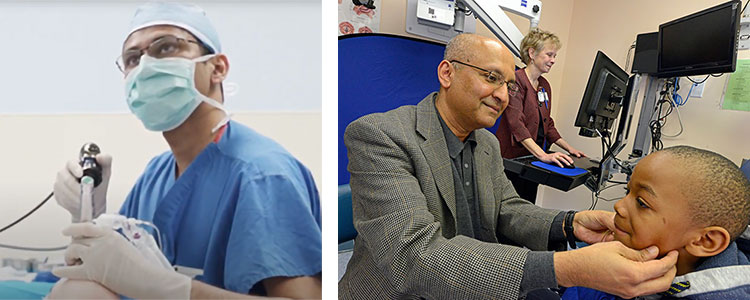Surgical ENT Solutions Explained: When Is It The Best Option?
Surgical ENT Solutions Explained: When Is It The Best Option?
Blog Article
Checking out the Area of Otolaryngology: What to Expect When You Seek Advice From an ENT
Otolaryngology, typically described as ENT, includes the medical diagnosis and therapy of ear, throat, and nose problems. For those experiencing related issues, seeking advice from an ENT specialist can give quality and alleviation. Comprehending what to anticipate during such assessments is important for reliable communication and treatment. This introduction will detail key elements of the ENT experience, consisting of typical reasons for visits and the processes associated with medical diagnosis and treatment.

Recognizing Otolaryngology: A Review
Otolaryngology, usually referred to as ENT (Ear, throat, and nose) medicine, is a specific branch of medicine that concentrates on the diagnosis and treatment of conditions impacting these crucial locations of the body. This field includes a wide variety of disorders, including those pertaining to hearing, balance, respiratory system function, and speech. Otolaryngologists are trained to manage both clinical and medical treatments, using advanced methods and modern technologies. Their expertise expands past standard disorders, resolving problems such as allergies, sinus infections, and hearing loss. Furthermore, they play an important function in the management of head and neck cancers cells, supplying complete care customized to private person requirements. Overall, otolaryngology remains crucial for preserving wellness and lifestyle in afflicted individuals.
Typical Reasons to See an ENT Expert
Several individuals seek the competence of an ENT professional for a variety of reasons, reflecting the diverse nature of conditions that impact the throat, ear, and nose. Common concerns include persistent sinus problems, which typically results in consistent nasal blockage and face pain. Allergies and their associated signs, such as sneezing and itching, likewise trigger brows through to these professionals (ENT surgery). Hearing loss, whether steady or sudden, is an additional substantial factor for assessment. Furthermore, people might seek assessment for throat disorders, consisting of consistent hoarseness or ingesting difficulties. Sleep apnea, identified by disturbed breathing during rest, is often dealt with by ENT specialists. Each of these conditions highlights the relevance of specialized treatment in managing complex ENT-related health concerns
Planning for Your ENT Appointment
When planning for an ENT appointment, it is necessary to gather relevant info and consider any kind of certain issues. People must compile a detailed clinical history, consisting of previous ear, nose, or throat problems, surgeries, and existing medications. Documenting signs and symptoms-- such as frequency, period, and intensity-- can supply valuable insights for the ENT specialist. Additionally, people should prepare a checklist of questions they wish to ask, making sure that all worries are addressed throughout the see. Bringing along any appropriate clinical documents or examination outcomes can further help the ENT in comprehending the person's problem. Clients must confirm their visit details, including area, time, and day, to lessen any type of final complication. Correct prep work can enhance the efficiency of the examination and bring about far better outcomes.
What to Anticipate Throughout the Examination
As the appointment starts, the individual can anticipate to involve in a comprehensive discussion with the ENT specialist concerning their signs and symptoms and case history. The specialist will certainly ask about the duration, regularity, and extent of signs and symptoms such as hearing loss, nasal blockage, or sore throat. Furthermore, the person's previous medical problems, drugs, and any appropriate family members history will be assessed, aiding the professional in creating a complete understanding of the person's health. The ENT might likewise ask about way of living variables, such as direct exposure to allergens or toxic irritants. This open discussion develops a structure for the appointment, making blog here sure that the patient's worries are dealt with and setting the phase for any necessary evaluations or referrals for treatment.
Diagnostic Examinations and Procedures in Otolaryngology
A series of diagnostic examinations and procedures are crucial in otolaryngology to accurately examine and identify problems affecting the nose, ear, and throat. Usual tests consist of audiometry, which gauges hearing function, and tympanometry, assessing middle ear stress. Nasal endoscopy permits visualization of the nasal passages and sinuses, while laryngoscopy checks out the throat and vocal cords. Imaging methods, such as CT scans and MRIs, provide in-depth sights of head and neck frameworks. Allergy screening might also be conducted to identify triggers for sinus or breathing problems. These analysis tools enable ENT experts to create a thorough understanding of individuals' problems, making certain tailored and efficient administration strategies. Correct medical diagnosis is important for successful treatment results in otolaryngology.
Treatment Choices Used by ENT Specialists
ENT experts use a selection of therapy alternatives customized to address certain problems influencing the nose, throat, and ear. These therapies range from conservative methods, such as medicine and way of living adjustments, to even more invasive procedures. Allergic reactions may be taken care of with antihistamines or immunotherapy, while persistent sinus problems may require nasal corticosteroids or sinus surgery. For hearing loss, ENT specialists typically suggest listening device or medical treatments like cochlear implants. In cases of throat problems, options can consist of speech treatment or operations to remove blockages. Furthermore, they may provide guidance for taking care of rest apnea, consisting of using CPAP devices or medical interventions. On the whole, the objective is to improve individuals' top quality of life through individualized care and efficient therapy methods.
When to Seek Follow-Up Treatment With an ENT
Acknowledging when to seek follow-up care with an ENT specialist is vital for taking care of ongoing signs or difficulties connected to nose, throat, and ear conditions. Patients need to consider setting up a follow-up appointment if symptoms continue regardless of initial therapy, such as persistent ear discomfort, nasal congestion, or throat discomfort. Modifications in hearing, balance concerns, or unusual nasal discharge may likewise call for further examination. In addition, if a client experiences side results from recommended drugs or has actually undergone an operation, follow-up treatment is essential to monitor healing and attend to any type of worries. Timely examinations try here can ensure effective monitoring of problems, stop potential problems, and give comfort concerning one's health and wellness. Looking for follow-up care promotes positive wellness administration in otolaryngology.
Often Asked Concerns

What Credentials Should I Try to find in an ENT Expert?
When looking for an ENT expert, one must look for board certification, appropriate experience, and strong person evaluations. Additionally, efficient interaction skills and a thoughtful approach can considerably boost the total therapy experience.
How Do I Choose the Right ENT for My Requirements?
Picking the right ENT professional includes reviewing their qualifications, experience, and individual testimonials (ENT Clinic). It is important to ponder their communication style and technique to treatment, guaranteeing they straighten with the person's specific health demands and choices
Exist Any Dangers Associated With ENT Procedures?
The risks connected with ENT procedures may consist of infection, blood loss, anesthetic problems, and prospective damages to surrounding structures. People must discuss these threats with their medical professional to understand specific worries and warranty notified decisions.
Just How Can I Handle Anxiousness Prior To My ENT Visit?
To manage anxiousness prior to a visit, individuals can practice deep breathing workouts, picture favorable end results, prepare concerns in breakthrough, and seek assistance from good friends or family, promoting a sense of confidence and calmness.
What Should I Do if I Experience Side Results From Therapy?
If side results from therapy occur, the individual must without delay report them to their medical care provider. Adjustments to treatment or additional treatments may be required to ensure security and efficiency in managing their problem - Hearing. As the consultation starts, the client can anticipate to involve in a detailed discussion with the ENT specialist regarding over here their signs and symptoms and medical background. These diagnostic devices allow ENT specialists to create a thorough understanding of clients' conditions, making sure tailored and effective management plans. ENT professionals provide a selection of treatment alternatives customized to deal with certain conditions impacting the nose, ear, and throat. When looking for an ENT expert, one need to look for board certification, appropriate experience, and strong person evaluations. Selecting the best ENT expert includes assessing their qualifications, experience, and client reviews
Report this page